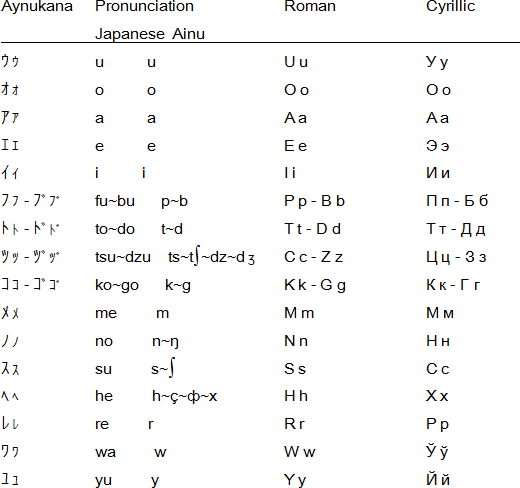Aynukana is a method of writing the Ainu language with half-wide Katakana devised by E.F., who finds the system currently used to write Ainu with Katakana to be somewhat unappealing, unsatisfactory and even confusing with regard to morphological structures.
The idea is to use a selection of half-wide Katakana to write Ainu alphabetically. For example Katakana KO is just /k/ in any position, including syllable-final and preceding /o/.
The five vowels of Ainu are the Katakana A I U E O. For Ainu /p/ he has chosen the katakana FU for historical and etymological reasons: the island of Iturup in the Kuriles, for example, is Etuworop in Ainu and Etorofu in Japanese. For the other ten Ainu consonants and semi-vowels he has chosen the Katakana graphemes with the least number of strokes (more or less) but he admits that one could chose other ones as well, especially for /s/ and /ts/. The semi-vowels (glides) /w y/ also have their own letters and are not written with Katakana U and I, as in the present system.
For titles, the first letter of proper names and of sentences etc. a larger size of the same Katakana is used, thereby creating a (kind of) bicameral script.

Aynukana

Roman
Sineantota petetok un sinotas kusu payeas awa, petetokta sine ponrupnekur nesko uray kar kusu uraykik neap kosanikkewkan punas-punas.
(Kamuy Yukar)
Cyrillic
Синэантота пэтэток
ун синотас кусу пайэас
аўа, пэтэтокта синэ
понрупнэкур нэско
урай кар кусу урайкик
нэап косаниккэўкан
пунас-пунас.
(Камуй Йукар)
Constructed scripts for: Ainu | Arabic | Chinese languages | Dutch | English | Hawaiian | Hungarian | Japanese | Korean | Lingala | Malay & Indonesian | Persian | Tagalog / Filipino | Russian | Sanskrit | Spanish | Taino | Turkish | Vietnamese | Welsh | Other natural languages | Colour-based scripts | Tactile scripts | Phonetic/universal scripts | Constructed scripts for constructed languages | Adaptations of existing alphabets | Fictional alphabets | Magical alphabets | A-Z index | How to submit a constructed script
[top]
You can support this site by Buying Me A Coffee, and if you like what you see on this page, you can use the buttons below to share it with people you know.

If you like this site and find it useful, you can support it by making a donation via PayPal or Patreon, or by contributing in other ways. Omniglot is how I make my living.
Note: all links on this site to Amazon.com, Amazon.co.uk
and Amazon.fr
are affiliate links. This means I earn a commission if you click on any of them and buy something. So by clicking on these links you can help to support this site.
[top]